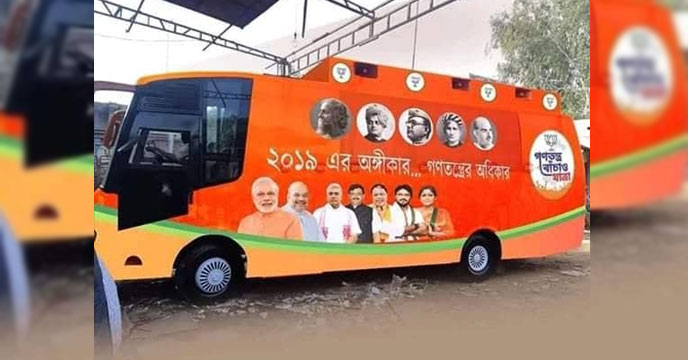
How CPI(M) is upsetting BJP apple cart in 'catchment area' West Bengal

West Bengal is among the “new catchment areas” the BJP has identified to equal the record the Congress had set under the leadership of Jawaharlal Nehru winning a third straight term at the centre.
For the fulfilment of its national aspiration of “abki baar 400 par (400+seats this time)”, it is crucial for the BJP to meet the target set by Union Home Minister Amit Shah of winning 35 of West Bengal’s 42 Lok Sabha seats in 2024.
The party has been compelled to look beyond its strongholds of Hindi heartland where it has hit a saturation point. But the BJP’s Bengal ambition is not matching the ground reality, according to an internal assessment done after the party’s rural outreach programme – the Gram Samparkha Abhiyan – launched in February turned to a damp squib.
The mismatch is blamed on the Left Front to a large extent by the BJP top leadership.
Also read: Adhir Chowdhury calls PM ‘Pagla Modi’, later clarifies it is ‘public sentiment’
Weakening BJP
It so happened that a post-mortem of the failure of the February programme revealed that many active workers in rural areas either left the party or became inactive and the party’s booth level presence still remained alarmingly low, said BJP insiders.
It may be recalled that a survey report prepared by BJP leaders Sunil Bansal and Mangal Pandey in November-December last year had pointed out that in 40 per cent of the state’s about 80,000 polling booths, the party’s organisational presence existed only on paper.
The latest reality check did not indicate any change in the situation towards betterment. Rather it was found that the party lost ground in many of the 77 seats it won in the 2021 assembly elections. Already, its effective strength in the assembly dwindled to 69 after it lost two seats in the by-elections, while six MLAs joined the TMC.
With an ambitious aim of securing 51 per cent votes in each booth, the BJP in March this year had started the process of forming booth-level committees with at least 30 members in each of them. But, so far, it has failed to form the committees in majority of the booths as finding 24 lakh dedicated workers for the committees became a difficult proportion, according to BJP sources.
Also read: BJP faces TMC barbs as Amit Shah visits Rabindranath’s house in Kolkata
Multiple problems
The grim scenario was also discussed in the closed-door executive meeting of the party held last Sunday, said Bengal BJP sources.
In the meeting, BJP national vice-president and former state president Dilip Ghosh was particularly vocal about the weakening of the party under his successor Sukanta Majumdar. “We need to reach out to the inactive members who have stopped attending party programmes. Crowds have become thin in party events,” a BJP source quoted Ghosh as saying in the meeting.
Many in the party fear that its organisational weakness would get further exposed during the month-long outreach programme it is launching this week with a plan to hold one meeting in each of the about 1,300 mandal committees it has in the state. Each mandal has several booths.
Top BJP leaders including Prime Minister Narendra Modi, Amit Shah and party national president JP Nadda will address a rally each during the month-long programme to commemorate completion of nine years of the party-led government at the Centre.
Weakening TMC
The erosion in the BJP support base is pinching the party more because it is happening at the time when the party being the main opposition in the state, ideally, should have been gaining ground taking advantage of the TMC’s adversity.
The state’s ruling party is on the backfoot over multiple corruption charges that saw the arrest of many of its top leaders; factional feuds in its grassroot-level organisations; protests by state government employees for non-fulfilment of their DA demand; deterioration of law and order and protests by the Kurmi community demanding ST status.
“If we can just retain the over 37 per cent votes that we had polled in the 2021 assembly elections, we will sweep the coming Lok Sabha elections. Unfortunately, we are unable to hold on to our support base,” said a leader of the BJP’s intellectual cell.
The TMC vote share in the last assembly elections surpassed 48 per cent, while the CPI (M)’s plummeted to a measly 4.71 per cent.
The calculation in the BJP is that from such a low base it will be difficult for the CPI(M) to finish at the top, unless there is a colossal vote swing in its favour, which is unlikely at present.
In the worst-case scenario, the TMC may lose 10 to 15 per cent votes. But the BJP does not appear to be the one to be benefitted from it. It would not have, however, complained had it been able to retain its turf.
Also read: Amit Shah has no right to say TMC govt won’t survive beyond 2025: Mamata
Advantage Left
That is not happening because the Left supporters, who had en masse joined the BJP ahead of the 2019 Lok Sabha elections, have started returning to their original party.
Shah, during one of his recent meetings with the party’s Bengal leadership, even expressed concern over CPI(M) regaining ground at the cost of the BJP.
The state leadership has been asked to take on the CPI(M) with as much vigour as they have been taking on the TMC.
“Our strategy of ignoring the CPI(M) projecting it as politically irrelevant in Bengal has backfired. Now the central leaders want us to simultaneously highlight the misgovernance of the TMC and the misrule of the erstwhile CPI (M)-led Left Front government,” said a BJP minority leader.
Only time will tell whether it’s the right strategy. But, it is clear the Left is certainly back in the reckoning in Bengal.

